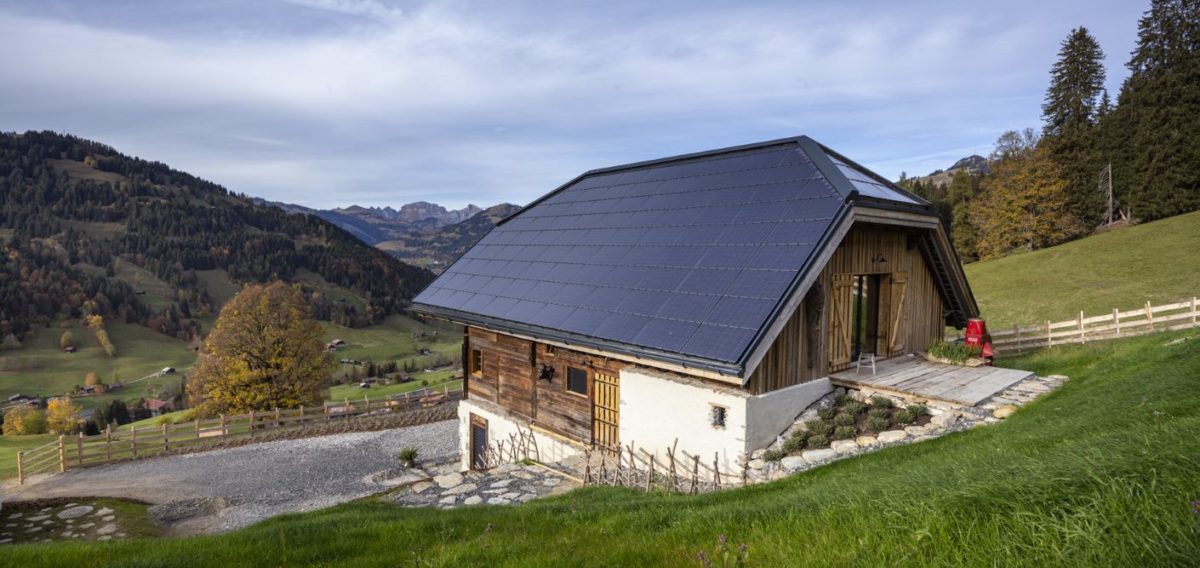Chinese module giant JinkoSolar may be earning the plaudits for committing to carbon free operations by 2025 but it is not the only solar company that can boast of its sustainability credentials – as Swiss building-integrated PV (BIPV) manufacturer 3S Solar Plus can testify.
With pv magazine’s UP campaign encouraging the solar industry to get on board with a cradle-to-cradle approach that aims for truly carbon free energy as part of a circular economy, the Thun-based BIPV company offers a model approach.
The solar roof manufacturer, which was part of solar equipment maker Meyer Burger from 2010 to mid-2018, may not have signed non-profit The Climate Group’s RE100 pledge to go carbon free by 2025 but if it did it would have to invest minimal effort to hit that target.
CEO Patrick Hofer-Noser told pv magazine the company’s manufacturing operation has been powered by certified hydropower and a rooftop PV system since 2010 and heating and cooling of the company’s building is driven by a ground water heat pump which is also powered by hydro.
One tweak required
Although the RE100 campaign encourages signatories to lean on suppliers to reduce the carbon embedded in their products, carbon-free materials not required to achieve the 2025 pledge so 3S would have just one measure to make, as the chief executive explained. “We have four or five diesel cars which we acquired with the share deal,” said Dr Hofer-Noser, referring to the deal to take the company back out of Meyer Burger. “They will be changed, in the normal rotation, to electric vehicles. Then it is important you charge them from non-fossil fuels, which we will do with certified hydro power.”
The Swiss manufacturer claims to have supplied more than 11,000 commercial and residential BIPV systems with its mono PERC cell-based MegaSlate solar roof its biggest seller. The chief executive was quick to stress his firm, with its 40 employees could not be compared with a global giant such as Jinko and said such industry leaders are much more able to apply the political pressure required to arrive at truly near-zero carbon end products.
“We are a small manufacturer and depend on a global supply chain,” said Hofer-Noser. Referring to the difficulty of ensuring a zero-carbon supply chain in solar manufacturing, he asked: “Where is your glass from? We use European suppliers, a German supplier, so it [carbon content] depends on the German energy mix. We also have no influence on polysilicon supply.”
Carbon pricing
The CEO explained 3S imports the solar cells for its roofing systems and is unable to control what energy source was used to make the polysilicon raw material or to manufacture ingots, wafers and cells from it. “The power of Jinko and other big players is to be able to exert political pressure on the energy mix supplied to and used by polysilicon companies,” said the 3S owner.
With Hofer-Noser certain a carbon price will arrive one day, the chief executive said his business would not suffer because it has already shielded itself against any impact, through its low-carbon drive.
“It will come,” he added. “If I’m low carbon I have no risk. We have mitigated the risk of political uncertainty and how high the carbon price will be. It’s about money. In the short term you make more profit [by not paying for carbon reduction] but in the long term you lose a lot of profit.”
This content is protected by copyright and may not be reused. If you want to cooperate with us and would like to reuse some of our content, please contact: editors@pv-magazine.com.




1 comment
By submitting this form you agree to pv magazine using your data for the purposes of publishing your comment.
Your personal data will only be disclosed or otherwise transmitted to third parties for the purposes of spam filtering or if this is necessary for technical maintenance of the website. Any other transfer to third parties will not take place unless this is justified on the basis of applicable data protection regulations or if pv magazine is legally obliged to do so.
You may revoke this consent at any time with effect for the future, in which case your personal data will be deleted immediately. Otherwise, your data will be deleted if pv magazine has processed your request or the purpose of data storage is fulfilled.
Further information on data privacy can be found in our Data Protection Policy.